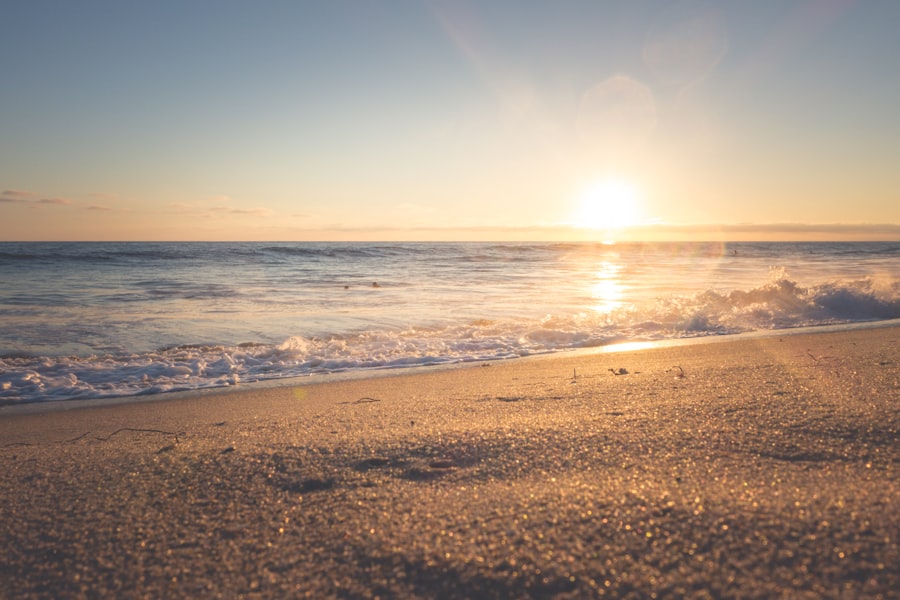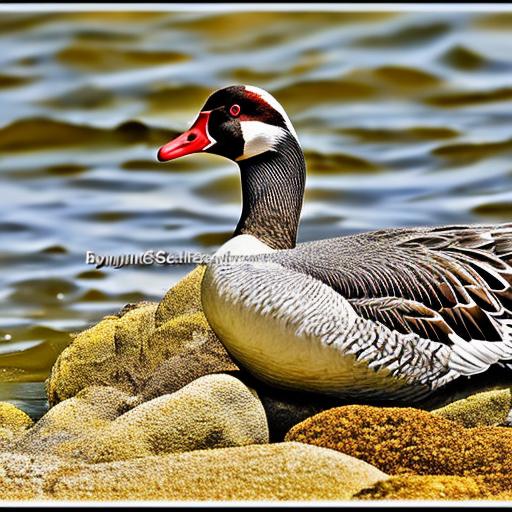Geese on beaches have become a growing concern in recent years. These large waterfowl are attracted to beaches for a variety of reasons, including the availability of food and open spaces. However, their presence can have a negative impact on beach ecosystems. Geese can damage vegetation, contribute to erosion, and create unsightly and unsanitary conditions. It is important to understand the behavior of geese and the impact they have on beach ecosystems in order to effectively manage their presence.
Key Takeaways
- Geese on beaches can cause significant damage to ecosystems and pose health risks to humans.
- Understanding the behavior of geese is crucial in developing effective strategies for keeping them off beaches.
- Legal considerations must be taken into account when implementing measures to deter geese from accessing beaches.
- Non-lethal methods, such as habitat modification and sound deterrents, can be effective in keeping geese off beaches.
- Physical barriers, such as fencing and netting, can also be effective in preventing geese from accessing beaches.
Understanding the behavior of geese
Geese are social animals that live in flocks and are known for their distinctive honking calls. They are attracted to beaches because they provide open spaces, access to water, and a source of food. Geese are herbivores and feed on grasses, aquatic plants, and grains. They are also known to graze on beach vegetation, which can lead to damage and erosion.
Geese interact with beach ecosystems in several ways. Their feeding habits can lead to the destruction of vegetation, which is important for stabilizing sand dunes and preventing erosion. Additionally, their droppings can contaminate the beach environment, making it unsightly and unsanitary for both humans and other wildlife. Geese also have the potential to disrupt nesting habitats for other bird species that rely on beaches for breeding.
The impact of geese on beach ecosystems
The presence of geese on beaches can have a negative impact on beach ecosystems. One of the main concerns is the damage caused by geese to beach vegetation and sand dunes. Geese feed on grasses and other plants, which can lead to the destruction of vegetation that helps stabilize sand dunes and prevent erosion. This can result in the loss of important habitat for other plant and animal species.
In addition to damaging vegetation, geese also contribute to the contamination of beach environments. Their droppings can accumulate on the beach, making it unsightly and unsanitary for both humans and other wildlife. The high nitrogen content in goose droppings can also lead to an increase in algae blooms, which can have negative effects on water quality and the overall health of the ecosystem.
Legal considerations for keeping geese off your beach
When it comes to managing geese on beaches, there are legal considerations that need to be taken into account. In many areas, geese are protected under federal and state laws, which means that certain methods of control may not be allowed. It is important to familiarize yourself with the laws and regulations that govern the management of geese on beaches in your area.
In some cases, permits may be required to implement certain control methods. These permits may have specific requirements and restrictions that need to be followed. It is important to consult with local authorities or wildlife agencies to ensure that you are in compliance with the law when implementing measures to keep geese off your beach.
Non-lethal methods for deterring geese
There are several non-lethal methods that can be used to deter geese from accessing beaches. One effective method is the use of noise makers, such as air horns or propane cannons. These devices emit loud noises that startle the geese and encourage them to leave the area. Another non-lethal method is the use of decoys, such as fake predators or other birds, which can create a sense of danger and discourage geese from landing on the beach.
Other non-lethal methods include habitat modification and harassment techniques. Habitat modification involves altering the beach environment to make it less attractive to geese, such as removing food sources or planting vegetation that is less palatable to them. Harassment techniques involve using trained dogs or other animals to chase away geese or using lasers or other visual deterrents to create a sense of danger.
Physical barriers to prevent geese from accessing the beach

Physical barriers can be an effective way to prevent geese from accessing beaches. Fencing is a common method used to keep geese out of certain areas. The fence should be at least three feet high and have small mesh openings to prevent geese from squeezing through. Netting can also be used to cover areas where geese are likely to land, such as sand dunes or grassy areas.
Another physical barrier that can be used is a floating barrier. This is a flexible barrier that is placed in the water to create a physical barrier between the beach and the geese. The barrier should be at least three feet high and extend several feet into the water to prevent geese from swimming around it.
Chemical deterrents for geese
Chemical deterrents can be used to keep geese off beaches, although they should be used with caution and in accordance with local regulations. Repellents can be applied to vegetation or other surfaces to make them unpalatable to geese. These repellents typically contain substances that are safe for humans and other wildlife but have a strong odor or taste that is unpleasant to geese.
Taste aversion agents can also be used to deter geese from feeding on certain areas. These agents are applied to vegetation or other food sources and make them taste bad to geese. This can discourage them from feeding in those areas and encourage them to seek out alternative food sources.
The importance of community involvement in keeping geese off beaches
Community involvement is crucial in managing geese on beaches. It is important for community members to be aware of the negative impact that geese can have on beach ecosystems and to take action to prevent their presence. This can include reporting sightings of geese, monitoring their activity, and participating in efforts to deter them from accessing beaches.
Community members can also play a role in educating others about the importance of keeping geese off beaches. This can include sharing information through social media, organizing community events or workshops, and working with local schools to incorporate education about geese and beach ecosystems into the curriculum.
The role of education in preventing geese from accessing beaches
Education plays a crucial role in preventing geese from accessing beaches. By educating the public about the negative impact of geese on beach ecosystems, people can become more aware of the need to take action to prevent their presence. This can include providing information about the damage caused by geese to vegetation and sand dunes, as well as the potential health risks associated with their droppings.
Education can also help to dispel myths and misconceptions about geese. For example, many people believe that feeding geese is harmless or even beneficial. However, feeding geese can lead to an overpopulation of geese in an area and can contribute to the destruction of vegetation and the contamination of beach environments.
Conclusion and future considerations for managing geese on beaches
In conclusion, the presence of geese on beaches can have a negative impact on beach ecosystems. Geese can damage vegetation, contribute to erosion, and create unsightly and unsanitary conditions. It is important to understand the behavior of geese and the impact they have on beach ecosystems in order to effectively manage their presence.
There are several methods that can be used to keep geese off beaches, including non-lethal methods such as noise makers and decoys, physical barriers such as fencing and netting, and chemical deterrents such as repellents and taste aversion agents. Community involvement and education are also important in preventing geese from accessing beaches.
Moving forward, ongoing monitoring and research are needed to better understand the behavior of geese and develop more effective methods for managing their presence on beaches. By working together, communities can help to protect beach ecosystems and ensure that they remain healthy and vibrant for future generations.
If you’re looking for effective ways to keep geese off your beach, you might also be interested in learning about renting a chicken coop. Poultry Wizard offers a helpful article on how to rent a chicken coop, which can be a great solution for those who want to keep geese away from their property. By having chickens in the coop, they can help deter geese from invading your beach area. To find out more about this option, check out Poultry Wizard’s article on renting a chicken coop.
FAQs
What are the common reasons for keeping geese off your beach?
Geese can cause damage to the beach ecosystem, leave droppings that can be unsanitary, and pose a potential safety hazard to beachgoers.
What are some effective ways to keep geese off your beach?
Some effective ways to keep geese off your beach include using decoys, installing fencing or netting, using noise deterrents, and implementing habitat modification.
What are some natural ways to keep geese off your beach?
Some natural ways to keep geese off your beach include planting vegetation that geese do not like, using natural predators such as dogs or hawks, and creating a natural barrier such as a rocky shoreline.
Is it legal to harm or kill geese to keep them off your beach?
No, it is not legal to harm or kill geese to keep them off your beach. Geese are protected under federal and state laws, and there are humane methods that can be used to deter them.
What are some potential negative consequences of using harmful methods to keep geese off your beach?
Using harmful methods to keep geese off your beach can result in legal consequences, harm to other wildlife, and damage to the beach ecosystem. It is important to use humane and effective methods to deter geese.
Meet Walter, the feathered-friend fanatic of Florida! Nestled in the sunshine state, Walter struts through life with his feathered companions, clucking his way to happiness. With a coop that’s fancier than a five-star hotel, he’s the Don Juan of the chicken world. When he’s not teaching his hens to do the cha-cha, you’ll find him in a heated debate with his prized rooster, Sir Clucks-a-Lot. Walter’s poultry passion is no yolk; he’s the sunny-side-up guy you never knew you needed in your flock of friends!







